In his 2003 memoir, Lucky Man, Michael J. Fox writes of the period in the 90s where his choices in film roles were based not entirely on artistic merit but more of a financial one. 1991’s The Hard Way and Doc Hollywood were mild hits for the actor. 1993’s For Love or Money and Life With Mikey weren’t. Fox felt the big box office money lie in family films. Unfortunately, the big money movies during those particular years were in Batman and dinosaur movies and any movie with a string of chart-topping Whitney Houston songs in it.
In the summer of 1993, Fox decided to make something a little more grown-up. He cautiously stayed away from R-rated material (such as 1988’s Bright Lights, Big City and 1989’s criminally under-rated Casualties of War) and signed on for Greedy—an all-star, big-budget, Universal comedy.
With Greedy, Fox could argue both artistic and financial merits for signing on. The sharply hilarious script was by Lowell Ganz and Babaloo Mandel (of Happy Days, Night Shift, Splash, Spies Like Us, Parenthood, City Slickers and A League of Their Own—titles any comedy writer would love to lay claim to just a single one of.) The director was Jonathan Lynn, the director who struck comedic and box-office gold with My Cousin Vinny two years earlier. The producer was Imagine Studios Wunder-producer Brian Grazer (Splash, Willow, Backdraft) while Fox would share the screen with the likes of Kirk Douglas and Phil Hartman. What could ever prevent a movie like this from being a major hit?
This: Greedy opened around the same time as Ace Ventura: Pet Detective. Even a month after release, Ace Ventura remained #1 at the box-office while Greedy came in 2nd during its opening weekend.
I haven’t seen Ace Ventura since July 1994, but I’ve watched Greedy many times since because it’s funny. Very funny. Is Ace Ventura dated? Somebody who’s seen it recently, please tell me. Greedy is not dated in the least. Well, okay, there’s a private detective in this movie that probably wouldn’t be needed because these days we have Google and Facebook but other than that, not dated.
Greedy focuses on the large McTeague family whose patriarch is Uncle Joe (Douglas), an elderly, very rich owner of a successful construction company. The McTeague’s are waiting for Uncle Joe to die so they can lay claim to his fortune and they’re willing to dig up any dirt they can to expedite the process. The McTeague clan feels it is just a matter of very short time until Joe is gone and one of them will be the chosen benefactor of his dough. Their plan seems foolproof enough—that is until they meet Molly.
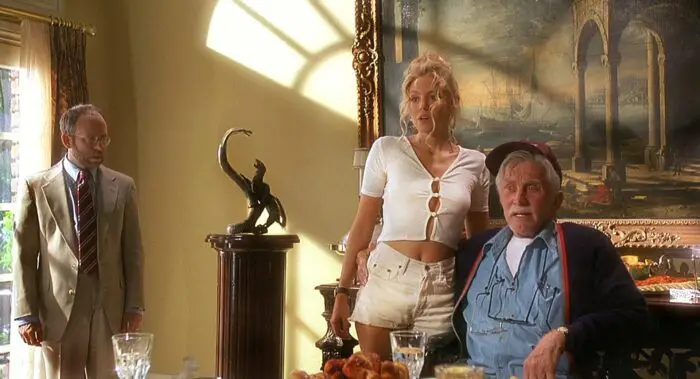
Molly (played with sincere charm by Olivia d’Abo) is Uncle Joe’s very British, very young, very attractive live-in “nurse.” She is also now, the McTeague’s very real threat and obstacle to getting his money. Enter the private detective (Khandi Alexander) who the family has hired to find out about Joe’s alluring new companion.
The detective informs the clan that Molly, a former nanny, charmed Joe one night while delivering his pizza. Since then, she’s been living in his mansion where she spends most of her time lying out by the pool in her bikini—and often without her bikini.
These first 15 minutes of Greedy brilliantly introduces Joe, Molly, and the McTeagues and what they’re all about. Because everyone is a joy to watch, it’s hard to know where to start with praise. From Phil Hartman as Frank, the family ring-leader who seems to have all the plans but is clueless in executing them to Ed Begley Jr. as the hapless Carl. Jere Burns plays the scheming Glen, Bob Balaban is Ed, a sometimes voice of reason but is more often for the money. Siobhan Fallon as Tina, Frank’s alcoholic wife who’s so wasted she never knows where she even is, and Joyce Hyser as Murial, Glen’s “partner” who she hates but goes along with his “plan” to portray a couple in order to get a cut of the cash. Hyser’s death stares to Burns are worth watching the first 15 minutes alone.
Then we’re introduced to Danny (Fox), the McTeague who got away years ago and never looked back. He couldn’t be more different from his conniving cousins. As a pro league bowler, he’s happy to perform the sport he loves and share his life with his supportive girlfriend, Robin (Nancy Travis). The family’s P.I finds Danny who want him to come back to help soften up Uncle Joe—and to assist in getting Molly out of the way for good. Because Danny’s been dealt a bit of bad luck in the form of a wrist injury, he decides to return.
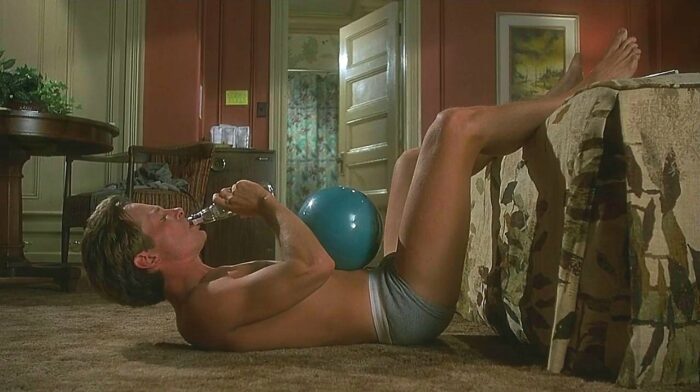
As expected, greed factors into each character’s moral center and soon, certain people are behaving in ways they never imagined they’d be capable of.
While the McTeague’s play on Uncle Joe’s emotions by stressing the importance of family, Molly understands that the ace up her low cut T-shirt is her attractiveness. While Molly seemingly has a good heart, the idea of one of the nasty McTeague shysters, all attempting to wrangle Joe out of his fortune before he’s even gone, becomes too much for her to watch. So she too gets caught up in the game of trying to best all of them. The one way she knows will be the most effective way to knock them down for the count: by offering Joe her body.
Greedy has now become about money and sex with battle lines drawn between everybody including Danny, who has now, despite Robin’s Jiminy Cricket-like intentions to save him from becoming another McTeague money-grubber, succumbed to the dream of possessing Joe’s fortune. Money can corrupt even the noblest among us. Even the genuine-hearted (Danny and Molly) can be at each other’s throats when a life of riches and comfort is dangled in front of them.
Is Joe the puppeteer controlling everybody, or is he genuinely seeking out the one individual who actually cares about him? Despite his weekly gatherings with his so-called family, he doesn’t seem to enjoy having them around. He does enjoy watching them tear at each other like wild jackals though. As long as they’re providing that level of amusement to him, Joe will let them hang around.
Joe’s smart enough to realize he won’t get genuine affection from them, so what about Molly? Nobody is certain what she provides him, but he obviously finds her company pleasing. This makes her another individual for his family to go after. But is she smarter than they give her credit for?
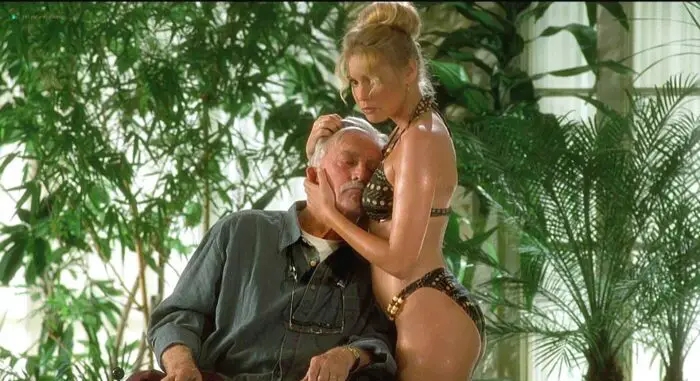
There’s certainly a lot to unpack morally in Greedy, but the humor flies so fast and continuously, you’re not going to get to them while watching it. Greedy has that rapid-fire dialogue that movies of the 1940s offered. Mandel and Ganz’s script, Lynn’s comedic timing, the sharp editing and the energy of every cast member (even the kids are very funny), make Greedy a very entertaining and pleasurable watch.
Greedy drew inspiration from both, Erich von Stroheim’s Greed (1924) and Stanley Donen’s Charade (1963), movies about money compromising self-identity for riches and duplicity. As we see in Greedy, Danny’s moral being becomes compromised much to Robin’s disappointment. In fact, the only one person not corrupted or tempted or even interested in Uncle Joe’s fortune is Robin. She is happy living in her one-room apartment and putting up with jerk co-workers in her sports broadcasting job. To her, this is all she needs to be happy. Robin’s integrity is never compromised. Instead of willing to watch Danny become something she finds rotten, she’d rather leave him. Danny, temporarily blinded by money lust, doesn’t realize how much Robin loves him. This is the kind of love Uncle Joe wishes for himself but realizes he’ll never get. Not from his family and not even from Molly. So he toys with all of them to the point where they turn on each other.
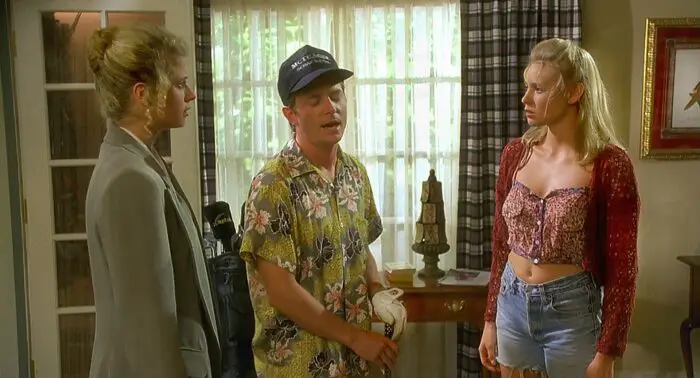
The only way to keep one’s morality in that house is to walk away before it’s too late. Early in the film, Ed asks his cousins if keeping their dignity and self-respect is more important than a pile of cash. They laugh in his face. And once Ed meets Molly, and sees her as a threat—the kind of real threat that he doesn’t feel regarding his dingbat cousins, he then joins in on the mob to get her out.
It’s interesting watching the dynamics between the family and Molly compared to how Molly reacts to Danny. The McTeague’s warn Molly to watch herself, which places her in a feeling of danger. She has no use for them either. But Danny is different. In one scene, Joe cruelly attempts to get Danny to contact his father and break dad’s heart for a bit of cash. This prompts Danny and Robin to leave in disgust with Molly then walking away herself very much disappointed in Joe behavior. It’s a wonderful moment where we see the tenderness in Molly’s heart.
Endings are tricky things to pull off in many movies, especially comedies. With so many characters and so many possible outcomes in Greedy, the end was very important. The wrong ending would have destroyed the fun which occurred throughout. The right people needed to get their final comeuppance while the characters the viewer had come to like, needed an ending which felt satisfactory to them. Greedy is a movie with twists throughout, much like 1996’s brilliant Ruthless People—another movie about two decent individuals entangled in a plot populated by scheming, duplicitous cads. The ending to that movie had to work or everything before it would have felt false. So, Greedy had to operate on the same level, and I’m happy to say that it does.
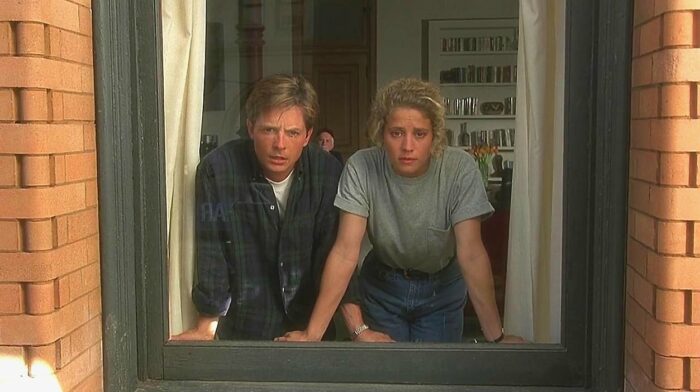
As to why didn’t Greedy find its audience in the spring of 1994, who can say? The Mask and Dumb and Dumber proved audiences were open to comedies. Was Greedy too smart for its own good? That’s difficult to say too. I mentioned Ace Ventura earlier but I don’t buy that it was the main reason this movie didn’t catch on. To me, Greedy was a film that giddily tickled the mind as it went along while Ace Ventura just felt like a frying pan to the skull. And I was a teenager at the time which was Ace Ventura’s prime demographic. Yet Greedy was the movie for me.
And while Michael J. Fox may feel a bit remorseful about his film choices during the 90s (when he won the Golden Globe for lead actor in a TV series for Spin City in 1997, he apologized there on stage, award in hand for appearing in 1996’s Mars Attacks!), he doesn’t need to feel bad at all for Greedy. It is one of the decade’s overlooked gems, an intelligent, vibrant comedy that’s rich (get it?) with laughs and performances that to this day, is worth every single penny.



